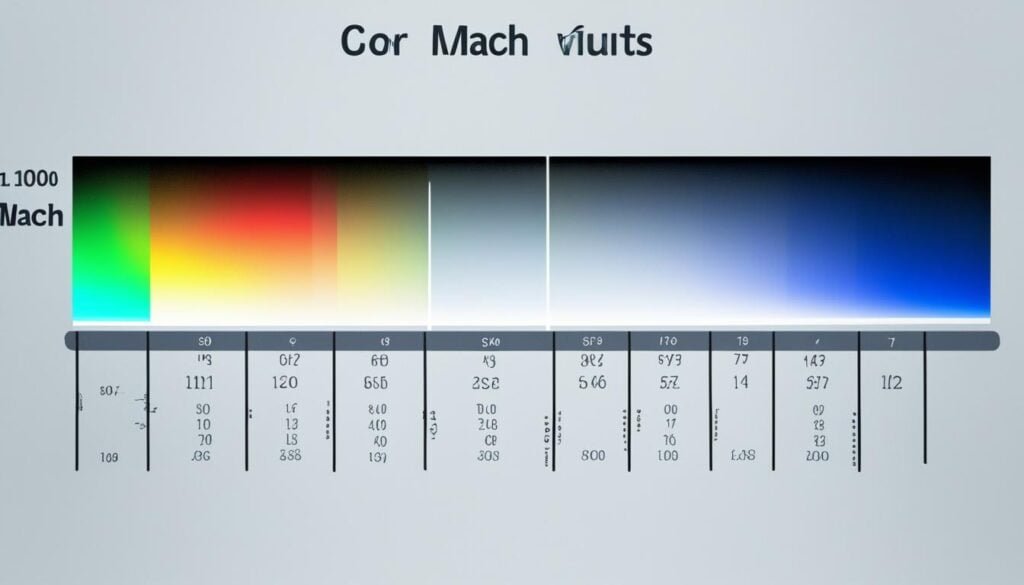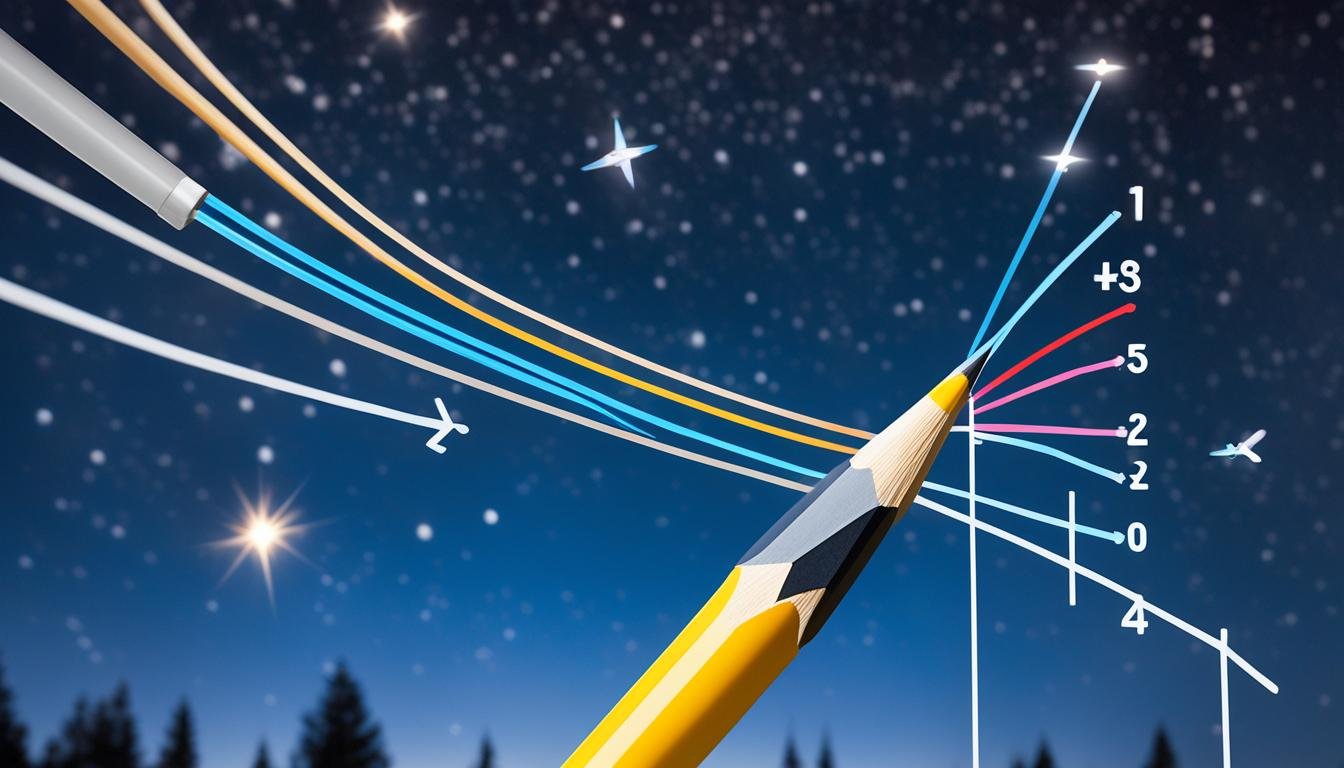Have you ever thought about how fast light travels? Light zips through a vacuum at 299,792,458 meters per second. That’s a whopping Mach 874,030.4897961. This huge number shows us just how fast light is compared to sound. It connects ancient Greek studies and Islamic scholars’ discoveries to today’s physics1.
Talking about light’s speed in Mach takes us beyond just the colors we see1. From red’s 700 nanometers to violet’s 400 nanometers. Dive into quantum theory to understand light’s particle, photons, and the science that explains how light and matter interact1. No matter your background, figuring out light’s Mach speed is like feeling the universe’s heartbeat.
Understanding the Concept of Mach Number
The term “Mach number” is key in high-speed travel and physics. It connects human engineering with natural limits like light’s speed. The Mach number measures how fast something goes compared to the speed of sound and light.
The Definition of Mach Number
The Mach number compares an object’s speed to sound’s speed. It splits flight into levels, from subsonic to hypersonic. Speeds under Mach 1 are called subsonic. Speeds over Mach 5 are hypersonic. The Mach number helps us understand speed in air23.
Comparing Mach with Other Speed Units
The importance of the Mach number is clearer when looking at other speeds. Subsonic planes fly slower than Mach 0.8. Supersonic fighters go faster, reaching up to Mach 5. Then, there are hypersonic speeds, up to Mach 10. Even so, a meteorite in Russia hit speeds around Mach 55 to 56, which is incredibly fast3.
Historical Development of Mach
The story of the Mach number is fascinating. It began with Isaac Newton’s work and led to Chuck Yeager breaking the sound barrier. Ernst Mach’s principles and Albert Einstein’s theories also played a part. Their work helped us understand the universe better through concepts like frame-dragging24.
Thinking about the Mach number for light speeds expands our minds. It makes us appreciate the speed of light in Mach terms. This challenges us to learn more and push boundaries.
Introducing the Speed of Light: A Constant of Nature
The journey into the speed of light is a deep dive into our universe’s fundamentals. It brings us to understand light speed’s constancy, a mainstay in physics. The speed of light, ‘c’, remains steadfast at 299,792,458 meters per second, around 670,616,629 miles per hour5.
The speed of light is the same everywhere in the universe. It’s a constant that has defined the meter since 1983. This aspect of light symbolizes its fixed pace and is central to theories in physics. It ties closely to general relativity’s core principle5.
Understanding light speed often means translating it into mach. This helps grasp the vast distances light can travel. It makes us realize how incredible light’s journey is, sparking curiosity and exploration.

James Clerk Maxwell showed that light’s energy is a type of mechanical energy. This linked electromagnetic energy to basic physics6. Albert Einstein built on this, showing light spreads as polarized waves. This was proven by Heinrich Hertz in 18886.
In recent theories, like Wolff’s 1990 hypothesis, the idea is that waves form particles by moving in opposite directions6. Max Planck in 1900 revealed light acts in distinct quanta, challenging the wave-only theory of light6.
Exploring the speed of light shows us a natural constant that has shaped science. It has evolved through a long history of discovery. Looking at light speed, we connect with an essential force that shapes our universe.
What Mach Is the Speed of Light?
Exploring Mach speeds and the speed of light takes us beyond what we usually understand. To figure out how fast light is in Mach – a measure used for really fast planes – we need a special formula. This formula shows us that light travels at an incredible Mach 874,030. Think about it like this: fast planes only fly between Mach 1 and 5. That’s nothing compared to the speed of light73. This huge number makes the speed of light a true wonder, stretching our imagination to its limits.
Converting Speed of Light to Mach Number
To grasp the meaning of converting light speed to Mach, we must know what Mach number is. It’s a way to compare an object’s speed to the speed of sound7. At sea level, on a typical day, sound travels at 340.3 meters every second7. As we go higher, this speed drops to about 295.0 meters per second at 11,000 meters7. This shows how much faster light is compared to speeds we’re more familiar with on Earth.
The Significance of Light Speed in Mach Units
To understand these big ratios, we look at how fast light is compared to different flight speeds. Subsonic planes, flying below Mach 0.8, use propellers and enjoy smoother flights73. Moving up to supersonic speeds, from Mach 1 to 5, planes need special designs to handle extreme speed and heat7. Hypersonic speeds, above Mach 5, challenge spacecraft like NASA’s X-43 with intense heat and chemical reactions during re-entry7. Yet, even these amazing speeds are nowhere near the speed of light. This shows just how vast the universe is, with light traveling through it effortlessly.
| Mach Number (Ma) | Equivalent Flow Velocity (m/s) | Aircraft Example |
|---|---|---|
| Subsonic (< Mach 1) | < 340.3 | Typical commercial airliner |
| Transonic (Mach 0.8 – 1.2) | 273 – 409 | Early jet fighters |
| Supersonic (Mach 1 – 5) | 410 – 1,702 | Concorde |
| Hypersonic (Mach 5 – 10) | 1,702 – 3,403 | NASA X-43 |
| High-hypersonic (Mach 10 – 25) | > 3,403 | Theoretical future spacecraft |
| Speed of Light (Mach 874,030) | 299,792,458 | N/A |
Studying Mach speeds lets us see the huge jump from our fastest creations to the constant speed of light. Knowing the speed of light in Mach feeds our curiosity and pushes us to invent even faster flight technology. One day, these dreams might break our bonds to Earth, bringing us closer to the vast universe’s mysteries738.
The Relationship Between Mach Number and Sound Speed
The study of Mach’s speed of light ties closely to sound speed. The Mach number is the object’s speed compared to sound speed. This comparison is key in aviation and aerospace. At sea level, sound travels at about 343 meters per second, or 767 mph39. One Mach equals this speed10.
Role of Sound Speed in Mach Calculation
Mach speed calculation for objects, including lights, show sound speed changes with the atmosphere. These changes affect Mach numbers and thus, how we design different aircraft3. Speed is sorted by type: subsonic is below Mach 0.83, transonic is Mach 0.8 to 1.3310, and hypersonic starts from Mach 1.3 to 2510.
Speed Variations and Mach Number Impact
Light’s Mach speed calculation shows speeds far beyond regular flying. Supersonic crafts exceed Mach 1, going up to Mach 539. Hypersonic vehicles even reach up to Mach 2510. The Concorde famously flew faster than Mach 2, cutting down flight times across the Atlantic9. These speeds bring challenges, such as the need for materials that withstand extreme pressures and heat10.
Below is a look at different crafts and their speeds:
| Aircraft/Object | Speed (mph) | Mach Number Range |
|---|---|---|
| Subsonic Aircraft | Up to 609 | |
| Transonic Aircraft | 609 – 914 | 0.8 – 1.2 |
| Supersonic Aircraft | 915 – 3,806 | 1 – 5 |
| Hypersonic Aircraft/Missiles | 3,806+ | 5 – 25 |
| Chelyabinsk Meteorite | 41,000 – 44,000 | 55 – 56 |
Hypersonic speeds aren’t just for the military or experiments. The Concorde showed commercial flights could also be super fast. It made the world smaller by reducing how long it takes to cross the Atlantic910.

We aim to break speed records, and studying Mach’s speed of light shows our limit. We see this in X-planes testing flight boundaries9 and NASA’s studies9. This journey involves technology, material sciences, and maybe even biology. It points to a future where we can quickly move through the skies, and maybe space too10.
Calculating Speed of Light in Mach: The Mathematical Approach
Exploring the mach speed of light equation is fascinating for velocity enthusiasts. Realizing that light’s speed—nearly 299,792,458 meters per second11—equals about 874,030 Mach blows our minds. It sets a grand scale to compare how fast the speed of light is in mach.

This conversion blends the measurement of sound with light’s incredible speed. When converting light’s speed into a speed of light in mach number, we match ‘c’s unchanging speed to sound’s variation. Sound travels at 340.3 meters per second7 at sea level, making Mach 874,030 an almost abstract, yet accurate, figure.
This calculation isn’t just theoretical. It’s crucial for spacecraft design and learning about space objects re-entering Earth. For example, the Space Shuttle hits Mach 25 on its way back8. Converting the speed of light provides a measureable context for cosmic velocities in aerospace.
| Condition | Mach Number (M) | Characteristics |
|---|---|---|
| Subsonic | M < 1 | Below the speed of sound8 |
| Transonic | M ~ 1 | Approximating the speed of sound8 |
| Supersonic | 1 < M < 3 | Surpassing the sound barrier8 |
| High Supersonic | 3 < M < 5 | Faster than standard supersonic speeds8 |
| Hypersonic | M > 5 | Exceptionally high speeds reached by specific aircraft or re-entering spacecraft8 |
Hypersonic speeds range from Mach 5 to 10, with high-hypersonic from Mach 10 to 25. These are just stepping stones to the Mach number for light speed7. Though mainly symbolic, it highlights our measurement achievements and human curiosity. It underlines the vast mystery ‘c’ holds within our world.
Practical Applications of Measuring Speed in Mach
Understanding speed is key in aerospace engineering. It helps explain what planes can and can’t do under different conditions. A deep understanding mach number for speed of light is vital. It affects how planes are designed and operated in the skies.

Use of Mach in Aerospace Engineering
Engineers always aim to push the limits of speed technology. Knowing how to calculate speed of light in mach is crucial. It sets the ultimate speed benchmark. Breaking Mach 1 introduces new aerodynamic issues that engineers must solve12.
Relevance to Supersonic and Hypersonic Flight
Commercial jets fly near Mach 0.85. But in the supersonic and hypersonic world, things get more interesting. Comparing sound speed at 20 degrees Celsius, about 343 m/s, with light’s speed shows a huge gap. Light travels at 300,000,000 m/s, a pace planes can’t reach yet12.
Calculate speed of light in mach
Click here to dive into the science of high-speed travel.
Contrasting Speed of Light with Commercial Airline Speeds
The vast universe is mind-blowing, especially when we talk about speed. Think about how fast light travels: about 670 million miles per hour. This huge number makes human-made speeds, like those of airplanes, seem very small. Airplanes fly fast for us, at speeds close to the sound barrier, but they’re nothing compared to light.
Comparing Commercial Flight Speeds to Speed of Light
Some commercial flights recently made news by flying faster than usual. Two planes flew over 800 mph, helped by strong winds, reaching speeds 200 mph faster than their normal cruising speed13. They rode on winds as fast as 265 mph, pushing them near but not past the sound barrier. These flights, one by China Airlines and the other by British Airways, reached speeds of 826 mph and 825 mph respectively13.
The Rarity of Supersonic Travel in Commercial Aviation
Even with these fast flights, supersonic travel is rare in commercial aviation. Comparing airplane speeds to the speed of light shows how vast differences are. Supersonic flights are usually military, with few commercial examples ever seen.
This table shows how airline speeds stand against the much faster speed of light.
| Measure | Commercial Airline Speed (mph) | Speed of Light (mph) |
|---|---|---|
| Typical Cruising Speed | 600 | ~670,000,000 |
| Record Speed (China Airlines) | 826 | |
| Record Speed (British Airways) | 825 |
Thinking about these vast differences amazes us. It makes us ponder our place in the universe and what we can achieve.

Exploring Supersonic Speeds with Real-World Examples
Comparing speed of light vs mach speed shows how different they are. Supersonic jets break the sound barrier at speeds just over Mach 1. But, they’re much slower than the speed of light. The speed of light is huge, showing how fast it is in the universe.
The light speed measurement shows us how new technologies like nanotechnology fibers can help in aviation. These fibers are about 30 times stronger than glass fibers. They make planes perform better at high speeds14. Also, innovations like new fuel cells could make electric planes possible14. We’re always trying to match nature’s speed.
To understand how fast light is in mach, we look at advanced materials. Things like new materials that are strong but light, and wings that change shape, show what nanotechnology can do14.

Nanoscience is also key for durable materials for devices at supersonic speeds14. These materials are vital for faster-than-sound travel. They help us go beyond the sound barrier.
- Advanced Sensors: Carbon nanotubes help detect explosives better, making flying safer14.
- Communication: Optics technology is crucial for sending data over long distances in aviation14.
Nanotechnology’s promise is huge for material science in aviation. While we can’t match light’s speed yet, nanotechnology could change how we define fast travel. Soon, light speed might set new goals beyond the sound barrier.
The Physics Behind the Speed of Light in Mach
Exploring high-speed travel starts with understanding Mach speeds. Subsonic conditions mean flying slower than sound, common in daily flights8. When things get faster, reaching Mach one, we hit transonic speeds. This is where we break the sound barrier, something once thought impossible8. Thinking about how fast light is in Mach terms? Picture the Space Shuttle during re-entry at Mach 258. Yet, this is nowhere close to the speed of light.

The Mach number is key in both aerodynamics and space science. It helps simulate flight conditions accurately. A Java applet on NASA’s website shows how to calculate Mach and sound speed8. This tool also points out how sound speed changes with the atmosphere, important on Earth and Mars8.
The speed of light, at 299,792,458 meters per second, stays the same everywhere in the universe11. This constant speed helps us measure the universe’s growth, which is speeding up. Even the eight-minute trip of sunlight to Earth is a reminder of the universe’s vast scale11.
| Speed Regime | Mach Number | Characteristic |
|---|---|---|
| Subsonic | < 1 | Common commercial flight speeds |
| Transonic | ~ 1 | Threshold of breaking the sound barrier |
| Supersonic | 1 < M < 3 | Fighter jets and supersonic aircraft |
| High Supersonic | 3 < M < 5 | Advanced military and experimental crafts |
| Hypersonic | > 5 | Space Shuttle re-entry speeds |
| Speed of Light | Equivalent to Mach 874030.489796 | Constant cosmic speed |
We gauge the universe’s vast distances by light speed. Stars like Proxima Centauri, 4.25 light-years away, become milestones. The Hubble Parameter even uses light speed to show how fast the universe is expanding11.
Exploring high-speed physics shows the huge gap between human-made speeds and light’s journey across space. This knowledge changes how we see speed and expands our view of the universe.
How to Convert Speed of Light to Mach Number
Understanding how fast light travels compared to things we know can be mind-blowing. Let’s simplify this by converting the speed of light into the Mach number. This makes it easier to grasp.
Mach Speed of Light Formula
The speed of light is 299,792,458 meters per second, or about 670,616,629 miles per hour. It sets the top speed for anything in the universe and is marked by ‘c’ in formulas11. The Mach number measures the speed of sound, depending on the air around us. To find the Mach number for light, we need the sound’s speed, around 343 meters per second at sea level on Earth. Here’s the formula:
\[Mach Number = \frac{Speed of Light}{Speed of Sound}\]
In simpler terms, the speed of light is about \(Mach 874,030\) under normal conditions.
Sample Conversion Calculation
To show how this works, let’s do an example. With sound’s speed at 343 meters per second, light speeds ahead at Mach \( \frac{299,792,458}{343} \). This Mach number is way beyond what fast jets or supersonic transports reach. It shows how theoretical this calculation is.
| Speed (m/s) | Mach Number |
|---|---|
| 343 (Speed of Sound) | 1 |
| 299,792,458 (Speed of Light) | 874,030 |
Even if these numbers help us understand, applying Mach to light speed is more theory. That’s because Mach numbers are for speeds in the air, and light speed is on another scale.

This knowledge helps us appreciate the work of groups like NASA. They give us space-watching tips and tackle complex tasks, like setting up Solar Sails or fixing telescopes. These efforts reflect our desire to know more about space15.
Conclusion
The quest to understand light’s speed through the Mach number shows the amazing mix of physics and creativity. The speed of light is really fast, at 299,792,458 meters per second. This equals about 670,616,629 miles per hour when converted to the Mach scale11. It shows us how big and important universal constants are in the universe and on Earth11. This discovery is thanks to years of scientific work. It started in the 17th century with a guess that light takes about 22 minutes to travel around Earth’s orbit11. Later, in the 19th century, scientists made more accurate calculations. Finally, in 1972, they used laser interferometers to measure light’s speed exactly11.
Our view of the universe’s size is based on the Hubble Parameter. This tells us how fast the universe is expanding11. Observations in the 1990s showed us the universe is speeding up, not slowing down. This helped scientists discover Dark Energy11. The speed of light doesn’t change, because of Special Relativity. This sets the top speed for how fast light and things without mass can travel11.
Learning about the speed of light opens the door to more discoveries. If you are curious, you can learn more about light-speed by checking out this article. Understanding these concepts helps us know more about the universe. It keeps our quest for knowledge going, bringing us closer to the stars with each discovery.
FAQ
What Mach number equals the speed of light?
The speed of light matches about Mach 874,030.489796. To get this, you multiply light speed by Mach 1 rate. Mach 1 is how fast sound travels in air.
How do you understand the concept of Mach number?
Mach number tells us how an object’s speed compares to sound speed. It’s key in studying how fast things like planes go.
Why is the speed of light considered a constant of nature?
The speed of light, or ‘c’, is always the same in empty space. It doesn’t change, no matter who’s looking or where. This fact is crucial to physics, helping us understand the universe.
How do you convert the speed of light to a Mach number?
To find light’s Mach number, multiply its speed (299,792,458 m/s) by the Mach conversion factor. This factor is based on sound’s speed in standard air conditions.
What is the significance of expressing light speed in Mach units?
Using Mach units for light speed shows how much faster it is than sound. It helps compare light to common speeds in aerodynamics, making its enormity understandable.
What role does the speed of sound play in Mach calculations?
In figuring out Mach numbers, sound speed matters a lot. It lets us compare object speeds to sound. Temperature and height can change sound speed.
How do variations in sound speed affect Mach numbers?
Changes in sound speed, caused by different atmospheres, shift Mach numbers. But, light’s speed and its Mach number stay steady.
How do you calculate the speed of light in Mach mathematically?
Calculating light’s speed in Mach involves its set speed (299,792,458 m/s). You then multiply by the Mach factor for the number.
What is the importance of measuring speed in Mach for aerospace engineering?
For aerospace, Mach numbers gauge plane speed effects. This info shapes design and tests for safe high-speed flight.
How does supersonic and hypersonic flight relate to understanding the speed of light?
Studying super (above Mach 1) and hypersonic (above Mach 5) flight offers insight into light’s incredible speed, way beyond our fastest.
How do commercial flight speeds compare to the speed of light?
Commercial jets fly much slower than light, which zooms at about 670 million mph. They usually move at Mach 0.8 to 0.9.
What insights do real-world supersonic speeds provide about Mach numbers?
Military jets hitting supersonic speeds show Mach numbers over 1. These feats give us a glimpse into the advanced tech needed to push speed limits.
What is the formula for calculating the Mach speed of light?
The formula multiplies light speed (299,792,458 m/s) by the Mach factor. This turns light speed into a Mach number.
Can you provide a sample calculation for converting the speed of light to a Mach number?
For a sample, the speed of light times Mach factor gives us Mach 874,030.489796. Just multiply (299,792,458 m/s) by (874,030.489796).
Source Links
- https://www.britannica.com/science/light
- https://www.nasa.gov/history/SP-4219/Chapter3.html
- https://www.universetoday.com/77077/how-fast-is-mach-1/
- https://en.wikipedia.org/wiki/Mach’s_principle
- https://en.wikipedia.org/wiki/Mach’s_principle
- https://www.spaceandmotion.com/Physics-Speed-of-Light-Gravity.htm
- https://en.wikipedia.org/wiki/Mach_number
- https://www.grc.nasa.gov/www/k-12/airplane/mach.html
- https://www.nasa.gov/learning-resources/for-kids-and-students/what-is-supersonic-flight-grades-5-8/
- https://www.scienceabc.com/eyeopeners/why-is-hypersonic-flight-such-a-big-deal-like-shown-in-top-gun-maverick.html
- https://www.universetoday.com/38040/speed-of-light-2/
- https://www.physicsclassroom.com/class/sound/Lesson-2/The-Speed-of-Sound
- https://www.businessinsider.com/how-fast-airplane-speed-winds-pushed-over-800-mph-2024-2
- https://nap.nationalacademies.org/read/10815/chapter/6
- https://www.nasa.gov/















